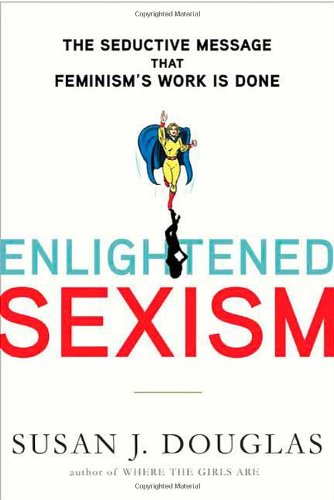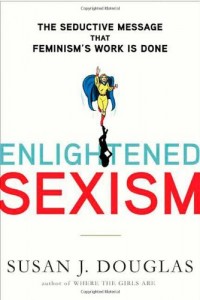
Enlightened Sexism: A Book Review
A few weeks ago, I received my very first review copy of a book in the mail, and you can imagine my excitement! The book was Enlightened Sexism by Susan J. Douglas, which only heightened my desire to get started on the book, because there had been some serious buzz about it around my Goodreads and Twitter communities. So I dove right in, and, I have to say, was both pleased and disappointed with the book in its entirety.
The entire premise behind the book was that sexism is institutionalized so much that we don’t even notice it anymore. Not only do we not notice it, but we are sent mixed messages all the time, telling us that the feminist struggle is over. I had no problem with this claim, as we’ve often talked about “the f-word” (feminism) and why we need to say loud and proud that we are feminists. I mean, this is the “I’m not a feminist…but” theory we’ve been talking about on here for a long time – and it was nice to see a published work tackling the subject. However, as I was reading, I found myself having more problems than praise for certain aspects of the book, which seriously turned me off to the arguments at hand.
First, I don’t often enjoy overtly sarcastic texts, and that’s just a personal preference. I do enjoy sarcasm, but when it’s used tastefully and in doses – like the sarcasm used by you lovely feminist bloggers – but an entire book of it is a little much. Also, when sarcasm is written down as opposed to stated, especially in an academic text, I have trouble deciphering which statements are meant as jokes or overt sarcasm and which are meant as legitimate evidence to a claim.
Which brings me to my next problem: sweeping generalizations. I hate sweeping generalizations, and when those sweeping generalizations are made as sarcastic remarks, I hate them even more. This book was filled with sweeping generalizations. For example, the entire chapter titled “Warrior Women in Thongs” was all about how we started seeing more strong women on television like Buffy the Vampire Slayer and Xena, Warrior Princess, but that these women were still expected to look cute. I’m not denying the power that media has over women and dictating body image, but the chapter turned into a sort of indictment of women who want to look cute – saying more or less that women who wear high heels or short skirts are bad feminists. I took issue with this as a feminist who enjoys wearing high heels myself. Feminism is all about choice! And if we don’t feel pressured by the media to wear the heels – if we legitimately like wearing heels (I know, weird, right? But I truly do!) – then why shouldn’t I just because I’m a feminist. A Funny Feminist had a great post up about feminism and body image recently that plays well into this argument, so go read it.
I think the problem I had with this chapter, as well as “The New Girliness” is that the media does not equal real life, and Douglas’ intended audience knows that. Yes, there is pressure out there, but I don’t think anyone looks at the television and says “Hey, this show is EXACTLY like my life!” Parts, yes, but the whole? I don’t think so. So, when arguing that television tells us that women are totally in charge and on top of the corporate world, we can’t really look at that and say “OK, feminism is over, we don’t need it any more” because there is a serious disconnect between television and real life. At least, I hope most people would notice that. “The New Girliness” continued, then, to set up feminism and girliness as binaries – complete opposites that were mutually exclusive, and I do not agree with that claim. I think positing that sort of attitude is what pushes young girls away from feminism in the first place. It shouldn’t be some exclusive club that you are only allowed access to if you aren’t “girly.” Even using the term “girly” as an anti-feminst thing is troublesome to people who don’t identify as “girls” and also feel rejected by the predominantly white, upper-to-middle class feminism that has pervaded the movement. But that’s another post for another time…
Another sweeping generalization I had a problem with was, well, the entire chapter titled “You Go, Girl.” It started with the quote on page 127: “We all instantly recognize Black Speak for what it is: way cool insider talk” and went downhill from there. I’m not saying that white people shouldn’t talk about race and language (I do… here’s an example), but it seems that this type of sarcastic comment just sets the conversation up as offensive, and I believe that’s exactly what happened.
The last sweeping generalization I took issue with in the chapter “Lean and Mean” was the pervasive idea that all size 0 girls are mean girls that deprive themselves of food. It is this kind of generalization that made it so hard for me to admit my size in the first place. Obviously, since my wedding dress is a size 2, I have starved myself to fit into it and am also a bridezilla. That’s right, people, these implications carry on well past high school and movies scripted by Tina Fey. Does the media pressure us to be thin and conventionally beautiful? Absolutely. Does being thin mean you’re anorexic and mean (and why is anorexic equated with mean in this chapter, anyway? One has nothing to do with the other, in my opinion)? Absolutely not, and I think that is an important distinction to make when discussing this topic. And I don’t believe Douglas did.
There were some great points and good information in this book, though, aside from the sweeping generalizations I discussed above. It is important to look at pop culture as a historical spectrum, and this book does tackle that very well. Douglas provides her audience with summaries of what was going on in the news, on television, and in music during the time periods she discusses, which gives the audience a very wide range in order to understand why various subjects hit American culture when they did, and also gives us a good idea as to how we got where we are now with feminism and women’s rights. The history of women in the media is something every feminist pop culture blogger should have a handle on before diving into a critique of modern day culture, and for that, this book is an excellent resource.
Other reviews you may be interested in:
Viva la Feminista
Gender Across Borders

![Reblog this post [with Zemanta]](http://img.zemanta.com/reblog_e.png?x-id=5715843f-e05b-4a37-9942-4ef0c6fd115e)
Pingback:WIMN’s Voices » Book Review: Enlightened Sexism by Susan Douglas